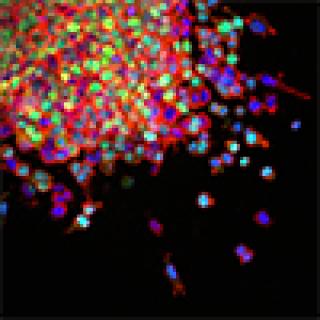News and Events
Celebrating CCR Careers: Steven Z. Pavletic, M.D., Ph.D.
Steven Z. Pavletic, M.D., Ph.D., is a renowned expert in chronic graft-versus-host disease, a serious late complication that can happen after allogeneic bone marrow transplants. After serving at the NCI for over 20 years, he is now announcing his retirement.
Read MoreT-cell stimulation could be used to target cancers with common TP53 gene mutations
Researchers in the Center for Cancer Research have found that circulating lymphocytes can be stimulated in the laboratory to generate cells that can recognize TP53 gene mutations. Mutations to the TP53 gene are found in about 40 percent of all cancers, making this process a potentially significant step forward in fighting many types of cancer.
Read MoreNew technology elucidates how metabolites interact with proteins to drive cancer
Acyl-coenzyme As (CoAs) are a group of small molecule metabolites that are the building blocks and chemical energy source for all living organisms. Recent evidence indicates that metabolites such as acyl-CoAs can also interact with proteins to drive the development of cancer.
Read MoreSide effects of CAR T-cell therapy are dramatically reduced with new receptor
A new immunotherapy for lymphoma has been found to cause lower levels of neurologic toxicity than other T-cell therapies for lymphoma. The findings come from the first clinical test of a CAR T-cell therapy using a new anti-cancer T-cell receptor developed in the Center for Cancer Research.
Read MoreNow recruiting: Combination therapy clinical trial for small-cell lung or small-cell extrapulmonary cancers
Anish Thomas, M.D., of the Developmental Therapeutics Branch, is leading a study of a drug combination to treat small-cell lung cancer that has come back after treatment as well as small-cell cancer that started at a site other than the lungs (extrapulmonary). Small-cell lung cancer is an aggressive, fast-growing type of lung cancer.
Read MoreGenomic profiles of lung cancer differ based on ancestry
An analysis of tumors from people with non-small cell lung cancer by researchers at the Center for Cancer Research revealed differences in genomic instability and homologous recombination deficiency in tumors from people with African ancestry compared to those with European ancestry. These findings highlight ancestry-related differences in tumor biology and may help improve our understanding of the higher incidence of cancer burden and high mortality observed in African Americans.
Read MoreClinical trial investigates IV administration of vaccine for advanced solid tumors
Marijo Bilusic, M.D., Ph.D., of the Genitourinary Malignancies Branch, is leading a clinical trial to test whether giving the MVA-BN-brachyury vaccine intravenously is safe for humans and has no intolerable side effects. The goal of the study is to see whether intravenous MVA-BN-brachyury vaccine can shrink tumors and slow or prevent the spread of cancer to other parts of the body.
Read MoreFDA grants orphan drug designation to zotiraciclib for the treatment of glioma
The U.S. Food and Drug Administration granted orphan drug status in December to zotiraciclib for use in patients with glioma, a cancer of the brain that begins in glial cells (cells that surround and support nerve cells). This designation is based on results from an ongoing NCI-sponsored phase 1 trial led by the CCR Neuro-Oncology Branch at the NIH Clinical Center.
Read MoreFDA grants orphan drug designation to zotiraciclib for the treatment of glioma
The U.S. Food and Drug Administration granted orphan drug status in December to zotiraciclib for use in patients with glioma, a cancer of the brain that begins in glial cells (cells that surround and support nerve cells). This designation is based on results from an ongoing NCI-sponsored phase 1 trial led by the CCR Neuro-Oncology Branch at the NIH Clinical Center.
Read MoreProtein affecting cell division hints at a way to overcome drug resistance
Researchers have uncovered the way in which a protein, called CLR4, helps complete the cell division process. The mechanism could potentially be harnessed to overcome resistance of cancer cells to chemotherapy drugs such as paclitaxel.
Read MoreJay Berzofsky and Hoyoung Maeng discuss new vaccine to help men with prostate cancer
Jay Berzofsky, M.D., Ph.D., Chief of the Vaccine Branch, and Hoyoung Maeng, M.D., Assistant Research Physician in the Vaccine Branch, recently discussed their ongoing work to design and develop vaccines and immunotherapy for cancer prevention and treatment with Cancer Therapy Advisor. They share how they are testing a vaccine that may one day delay the need to use androgen deprivation therapy (ADT) in prostate cancer patients.
Read More








